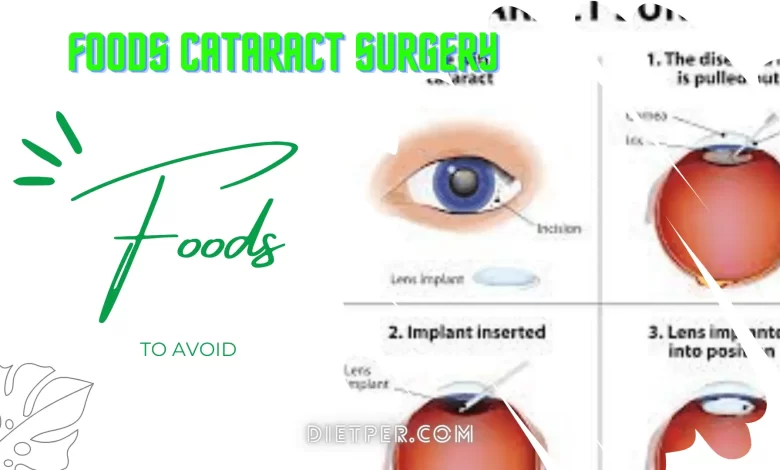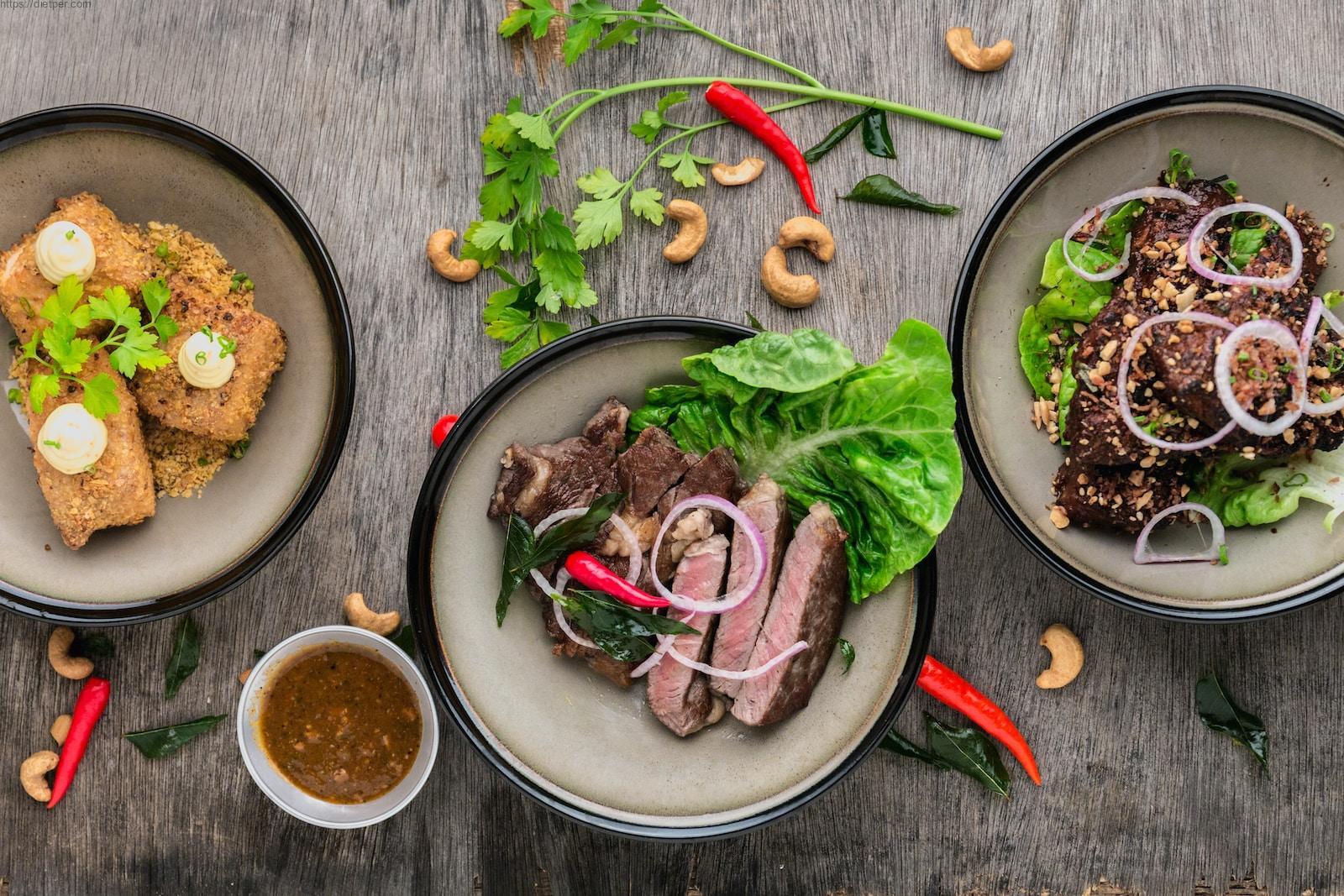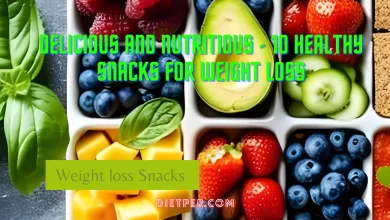
Foods to Avoid / Food not to eat after cataract surgery: Cataract surgery is a common and effective procedure aimed at improving vision by removing the eye’s clouded lens and replacing it with an artificial lens. While cataract surgery is relatively quick and minimally invasive, the following recovery period is crucial for ensuring successful outcomes. During this time, the eye undergoes healing and adjustment processes, and proper care is essential foods to avoid complications and promote optimal healing. One often overlooked aspect of this recovery phase is dietary considerations. What you eat can significantly impact your recovery journey. The foods you choose can influence inflammation levels, healing processes, and overall comfort during recovery.
Foods to Avoid After Cataract Surgery
A. High Sodium Foods
After cataract surgery, it’s advisable to steer clear of foods high in sodium. Sodium plays a significant role in fluid retention and can lead to increased blood pressure, which might be detrimental to the delicate healing process of your eyes. Excess fluid retention could result in discomfort and swelling and even interfere with the clarity of your vision as your eyes recover.
To minimize sodium intake, avoiding certain foods notorious for their high sodium content is important. Canned soups, for instance, often contain elevated sodium levels as a preservative and flavour enhancer. Similarly, processed meats like sausages, deli, and bacon can increase sodium intake. Additionally, salty snacks such as chips and pretzels should be consumed in moderation or avoided during this crucial healing period. By being mindful of your sodium intake and avoiding these high-sodium foods, you can contribute to a smoother and more comfortable recovery process, allowing your eyes to heal optimally and without unnecessary complications.
B. Sugary and Highly Processed Foods
In the post-cataract surgery recovery phase, it’s important to be cautious of consuming sugary and highly processed foods. These types of foods have the potential to contribute to inflammation within the body, which could impede the healing process of your eyes. Excessive inflammation might lead to discomfort, prolonged recovery times, and even suboptimal visual outcomes.
Sugary desserts, such as cakes, cookies, pastries, and sugary beverages, like sodas and certain fruit juices, foods to avoid. These foods can cause spikes in blood sugar levels, triggering an inflammatory response. Moreover, processed snacks, often high in unhealthy fats, sugars, and additives, can similarly affect your overall well-being and recovery.
By making conscious choices to limit your intake of sugary and highly processed foods, you are aiding in a faster recovery and promoting your overall health. Opting for nutrient-rich, whole foods instead can provide the essential vitamins and minerals needed for proper healing. They can contribute to a more comfortable recuperation period following your cataract surgery.
C. Spicy Foods
During the recovery period following cataract surgery, foods to avoiding spicy foods is advisable. Spicy foods have the potential to cause discomfort and irritation to the eyes, which are already in a sensitive state as they heal. The capsaicin compound found in many spicy ingredients can lead to a burning sensation and increased tear production, which might hinder the healing process and cause unnecessary discomfort.
Specifically, it’s best to steer clear of hot sauces, which are concentrated sources of heat-inducing compounds, as well as extremely spicy curries and dishes that contain a lot of chilli peppers. These foods can potentially exacerbate any irritation your eyes might be experiencing, making your recovery less pleasant than it could be.
By opting for milder, non-spicy options during this recovery period, you can help ensure that your eyes are given the best chance to heal comfortably and efficiently. It’s essential to prioritize your eye health and minimize any potential sources of discomfort during this critical phase.
D. Caffeinated Beverages – Foods to avoid
Caffeinated beverages should be consumed in moderation or foods to avoided altogether during recovery following cataract surgery. This is primarily due to caffeine’s potential to cause dehydration, which can negatively affect healing. Dehydration might lead to dry eyes and discomfort, which is counterproductive to recovery.
Furthermore, caffeine can also impact sleep patterns. Quality sleep is crucial for the body’s healing mechanisms, and sleep disruptions can slow recovery. Caffeine’s stimulating effects might interfere with your ability to get adequate rest, making it even more important to be mindful of your caffeine intake during this period.
Beverages such as coffee, energy drinks, and excessive amounts of tea should be limited, especially in the immediate aftermath of surgery. Hydrating alternatives like water, herbal teas, or caffeine-free beverages can support your body’s healing processes without introducing potential complications. Prioritizing hydration and healthy sleep patterns can contribute to a more efficient and comfortable recovery from cataract surgery.
Popular Blogs :
- Foods To Avoid Eat After Cataract Surgery in 2023.
- Carnivore Diet vs. Keto: Comparing 2 Low-Carbohydrate (2023)
- 4-week Mediterranean diet menu plan Flavorful Wellness Journey
E. Alcoholic Beverages Foods to avoid
In the aftermath of cataract surgery, it’s important to exercise caution and refrain from consuming alcoholic beverages. Alcohol can potentially hinder the healing process and interact with medications you might be taking during your recovery period.
Alcohol can adversely affect the body’s ability to heal by compromising the immune system and interfering with the body’s natural restorative processes. Moreover, some medications prescribed post-surgery may not interact well with alcohol, potentially reducing their effectiveness or causing unwanted side effects.
To ensure a smooth and uncomplicated recovery, it’s advisable to abstain from alcoholic beverages for the duration of your recovery period. Prioritizing a healthy and healing-friendly lifestyle, which includes foods to avoiding alcohol, will contribute to the success of your cataract surgery and minimize any potential complications that could arise from its consumption during this critical phase.
F. Fried and Greasy Foods to avoid
During the recovery phase following cataract surgery, minimizing your consumption of fried and greasy foods is recommended. These foods can pose several challenges to your recovery process, primarily due to their potential to cause digestive issues and discomfort.
Fried foods, such as deep-fried snacks and dishes, are often high in unhealthy fats and difficult to digest. Consuming these foods might lead to gastrointestinal discomfort, bloating, and other digestive disturbances, which can be particularly troublesome as your body is already working to heal.
Fatty cuts of meat and heavily greased dishes are also examples of foods to be cautious about. The excessive fat content in these foods can impact digestion and potentially contribute to inflammation and overall discomfort during your recovery.
You can promote a more comfortable and efficient recovery process by opting for lighter, nutrient-rich meals that are easier on your digestive system. Foods like lean proteins, whole grains, and vegetables should be prioritized, as they provide essential nutrients without burdening your body’s healing mechanisms. This dietary approach can contribute to a smoother recovery journey and help you return to normal activities with less discomfort.
Recommended Foods During Cataract Surgery Recovery
A. Hydrating Foods
Staying well-hydrated is crucial for supporting optimal recovery after cataract surgery. Hydration plays a significant role in various bodily functions, including healing. Consuming hydrating foods can help maintain the right fluid balance and give your body the necessary nutrients to heal efficiently.
Hydrating foods are rich in water content and can contribute to your overall hydration levels. Cucumbers, for example, comprise over 90% water and are also packed with vitamins and minerals that support healing. Watermelon is another excellent choice, not only for its high water content but also for its natural sweetness and the presence of antioxidants that can aid in reducing inflammation. Oranges, a citrus fruit, provide hydration and vitamin C, which are vital for collagen production and tissue repair.
By incorporating these hydrating foods into your diet, you can help ensure that your body remains adequately hydrated during recovery. This, in turn, promotes a favourable environment for healing and contributes to a smoother and more comfortable recovery after cataract surgery.
B. Nutrient-Rich Foods
Focusing on nutrient-rich foods can greatly support the healing process during the recovery period following cataract surgery. Vitamins and minerals are essential in tissue repair, immune function, and overall well-being, making them integral to your recovery journey.
Vitamin C, for instance, is known for its role in collagen synthesis, a protein crucial for wound healing. Vitamin A supports the health of your eye’s surface tissues and can aid in reducing the risk of infection. Minerals like zinc are involved in the body’s immune response and can contribute to a faster recovery.
Including nutrient-rich foods in your diet is a practical way to ensure you provide your body with the necessary building blocks for healing. Leafy greens, such as spinach and kale, are packed with vitamins A and C and other antioxidants that promote eye health. Colourful vegetables like carrots and bell peppers provide a range of vitamins and minerals. Lean proteins, like poultry, fish, and legumes, supply essential amino acids for tissue repair.
By incorporating these nutrient-dense foods into your meals, you’re supporting your recovery and taking a proactive approach to your overall health. After cataract surgery, a well-balanced diet enriched with vitamins and minerals can contribute to a smoother and more efficient healing process.
C. Fiber-Rich Foods
Including fibre-rich foods during the recovery phase after cataract surgery can offer multiple benefits for digestion and overall health. Fibre is pivotal in maintaining a healthy digestive system, regulating bowel movements, and supporting gut health.
Dietary fibre comes in two forms: soluble and insoluble. Soluble fibre, found in foods like oats, beans, and fruits, forms a gel-like substance in the digestive tract, helping to soften stools and ease their passage. Insoluble fibre, abundant in whole grains, nuts, and vegetables, adds bulk to stools and assists in preventing constipation.
Beyond aiding digestion, fibre has a broader impact on your well-being. It helps manage blood sugar levels, supports a healthy weight, and contributes to heart health by lowering cholesterol levels.
Incorporate fibre-rich foods such as whole grains (brown rice, quinoa), legumes (lentils, chickpeas), and fruits with skin (apples, pears) into your diet. These foods promote regularity and provide sustained energy and satiety, which are crucial during recovery. Focusing on fibre-rich options can enhance your digestive comfort and contribute to a healthier recovery after cataract surgery.
D. Anti-Inflammatory Foods
Incorporating anti-inflammatory foods into your diet during the recovery period following cataract surgery can positively impact reducing inflammation and discomfort. Inflammation is the body’s natural response to injury or stress, but excessive inflammation can impede the healing process and lead to discomfort or prolonged recovery times.
Anti-inflammatory foods contain compounds that can help modulate the body’s inflammatory response and promote a more balanced healing process. Turmeric, for instance, contains curcumin, a potent anti-inflammatory compound that has been studied for its ability to reduce inflammation and support healing. Similarly, ginger has anti-inflammatory and antioxidant properties that can aid in reducing post-surgical discomfort.
Fatty fish, such as salmon, mackerel, and sardines, are rich in omega-3 fatty acids, which have been shown to have anti-inflammatory effects. These healthy fats can help counteract inflammation and support healing mechanisms.
Incorporating these anti-inflammatory foods into your diet can create an environment that encourages healing while minimizing unnecessary discomfort. Remember that a well-balanced diet that includes a variety of anti-inflammatory foods can play a role in your overall comfort and recovery after cataract surgery.
E. Easy-to-Digest Foods
Opting for easy-to-digest foods during the recovery period after cataract surgery can relieve your digestive system and contribute to a more comfortable healing experience. These foods are gentle on your stomach and require minimal effort for digestion, ensuring that your body can direct its energy towards the healing process.
Cooked vegetables are an excellent choice as they are softer and easier for your body to break down than raw vegetables. Steamed or boiled vegetables like carrots, zucchini, and spinach can provide essential nutrients without undue stress on your digestive system.
Oatmeal is another valuable addition to your post-surgery diet. It’s soft and comforting and a good source of soluble fibre, which can support healthy digestion and prevent discomfort.
Yoghurt can contribute to a balanced gut microbiome, especially varieties with live cultures like probiotics. Probiotics can aid digestion and promote overall gut health, which can be particularly beneficial during your recovery.
Choosing these easy-to-digest foods allows your body to utilize its resources efficiently for healing rather than struggling with digestion. Incorporating such foods into your diet can lead to a smoother and more comfortable recovery period after cataract surgery.
General Tips for a Healthy Recovery Diet
After cataract surgery, maintaining a healthy recovery diet is pivotal in optimizing healing and ensuring a smooth recovery. Attention to what you eat can contribute significantly to your comfort and well-being during this critical period. Here are some essential tips to guide you toward a nourishing and effective recovery diet:
A. Stay Hydrated
Staying hydrated is of paramount importance during your recovery journey. Adequate water intake supports various bodily functions, including the healing process. Proper hydration helps maintain the right fluid balance in your body, aids digestion, and ensures that essential nutrients are efficiently transported to the areas that require healing. Drinking enough water also helps prevent issues like dry eyes, which can be aggravated by surgery-related dehydration.
B. Listen to Your Body
Your body’s signals are a valuable guide when choosing the right foods. Pay close attention to any discomfort or adverse reactions to certain foods. After surgery, your body may have specific sensitivities, and some foods well-tolerated before might not be suitable during recovery. Consider adjusting your diet if you notice any signs of digestive distress, bloating, or discomfort. This mindful approach allows you to cater to your body’s unique needs and promotes a more comfortable recovery.
C. Follow Medical Recommendations
Medical professionals, including dietary choices, play a crucial role in guiding your recovery. It’s essential to follow any dietary guidelines your doctor or surgeon provides. They might recommend specific foods to avoid or emphasize nutrients that aid healing. If you have any dietary restrictions or medical conditions, consulting your healthcare provider before making significant dietary changes is crucial to ensure that your choices align with your recovery goals.
D. Gradual Return to Normal Diet
While adhering to dietary restrictions during the recovery phase is important, it’s equally vital to recognize that these restrictions are often temporary. As your body heals and adjusts, you can gradually reintroduce temporarily foods to avoid. However, it’s advisable to reintroduce foods slowly and observe how your body reacts. This gradual approach helps prevent overwhelming your system and allows you to identify any lingering sensitivities.
Showering and washing hair after cataract surgery
After cataract surgery, it’s important to take certain precautions when it comes to showering and washing your hair to ensure a smooth recovery and minimize the risk of complications.
During the initial days after surgery, you should avoid getting water directly into your eyes. This is crucial to prevent any potential infection or irritation. Here’s how you can approach showering and washing your hair after cataract surgery:
- Showering: When showering, make sure to keep your face and eyes shielded from direct water contact. You can do this by gently tilting your head back and using a clean washcloth or cotton balls to cover your eyes. Alternatively, some people find it helpful to wear a clean, dry pair of goggles while showering.
- Washing Hair: Washing your hair requires extra care. Consider having someone help you during the first few days to ensure water doesn’t accidentally enter your eyes. If you prefer to wash your hair yourself, use a gentle, tear-free shampoo and keep your eyes closed tightly throughout the process. You can also use a protective shield, like a clean towel or shower cap, to cover your eyes while washing your hair.
- Drying Off: After showering, gently pat your face dry with a clean and soft towel. Avoid rubbing your eyes, as they might be more sensitive during the initial recovery period.
- Consult Your Doctor: Before you resume your regular showering and hair-washing routine, it’s a good idea to consult your eye surgeon. They can provide personalized advice based on your specific situation and the progress of your recovery.
Cooking after cataract surgery
Cooking after cataract surgery requires some considerations to ensure your eyes remain protected during the healing process. While you can resume cooking relatively soon after surgery, it’s important to take precautions to prevent any potential irritation or complications. Here are some tips for cooking safely after cataract surgery:
- Eye Protection: Wear protective eyewear or glasses while cooking. This will help shield your eyes from any potential splatters, steam, or hot oils that could cause discomfort or irritation.
- Avoid High Heat: Cooking methods that involve high heat and steam, such as frying or boiling, might expose your eyes to irritants. Consider opting for gentler cooking techniques like baking, roasting, or sautéing with a lid on the pan to minimize steam exposure.
- Use Kitchen Tools: Be cautious when using kitchen utensils that could accidentally come into contact with your eyes. Keep spatulas, ladles, and other utensils away from your face while cooking.
- Maintain Distance: Keep a safe distance from the stovetop or oven to reduce the chances of steam or hot air coming into contact with your eyes.
- Enlist Help: If possible, ask for assistance with cooking tasks that involve higher risks, such as flipping foods in a hot pan. Having a family member or friend help you can prevent any accidental mishaps.
- Prep Ahead: Prepare ingredients ahead of time to minimize the time spent around heat and steam. This way, you can focus on assembling and cooking dishes more efficiently.
- Gentle Clean-Up: When cleaning up after cooking, avoid using strong chemicals or cleaners that could potentially irritate your eyes. Opt for gentle and eye-safe cleaning solutions.
- Rest When Needed: If you experience any discomfort or eye strain while cooking, it’s okay to take breaks and rest your eyes. Prioritize your comfort and well-being.
People Also Ask – Foods To Avoid
Food not to eat after cataract surgery?
Avoid high-sodium, sugary, spicy, and greasy foods, as well as caffeine and alcohol, to support healing.
Can I drink milk after cataract surgery?
Yes, drinking milk is generally safe and can provide nutrients beneficial for recovery.
What is considered strenuous activity after cataract surgery?
Strenuous activities include heavy lifting and intense exercises, which should be avoided to prevent strain on your eyes during recovery.
How long do I need to wear dark glasses outside after cataract surgery?
Wear dark glasses for at least a week when outdoors to shield your eyes from UV rays during the healing phase.
How soon can I eat after cataract surgery?
Follow your surgeon’s recommendations, but generally, you’ll need to wait until you receive clearance from your medical team before eating after surgery.
How long does it take for the incision to heal after cataract surgery?
The incision usually takes a few weeks to fully heal, but proper post-operative care is crucial for a smooth healing process.
Frequently Asked Questions – Foods To Avoid
What should I eat the day before cataract surgery?
Opt for easily digestible, light meals with a focus on whole foods like vegetables, lean proteins, and whole grains. Avoid heavy or fatty foods.
What should you not do before cataract surgery?
Avoid eating or drinking anything several hours before the surgery, follow your doctor’s instructions regarding medications, and refrain from wearing makeup, jewelry, or contact lenses.
Why can’t you have coffee before cataract surgery?
Coffee and other caffeinated beverages can cause dehydration and affect blood pressure, which might impact the surgery and recovery.
Is fasting necessary before cataract surgery?
Yes, fasting is usually required before cataract surgery to prevent potential complications during anesthesia.
Can I eat breakfast before cataract surgery?
In most cases, no. You’ll likely be asked to avoid eating or drinking anything, including breakfast, before cataract surgery.
What foods to avoid during cataract surgery?
Avoid high-sodium foods, sugary and highly processed foods, spicy foods, caffeine, alcohol, and fried or greasy foods during cataract surgery recovery to promote optimal healing and comfort.
Conclusion – Foods To Avoid
In the aftermath of cataract surgery, the journey towards recovery presents a crossroads defined by your choices, each holding the potential to influence your healing process profoundly. By delving into the understanding of foods to avoid and embracing dietary decisions that nurture a smoother recovery, you can orchestrate an optimized path towards recovery while nurturing your holistic well-being.
Disclaimer
This blog post aims to empower you to make informed and health-conscious food choices. Your well-being is of paramount importance, and it’s essential to prioritize your health before embarking on any restrictive diets. Therefore, if you have any concerns, it is highly advisable to seek guidance from a healthcare professional or registered dietitian before making dietary changes.





